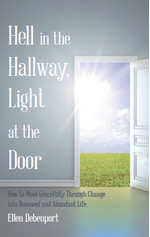 Chances are you have experienced an unexpected trial at sometime during your life. A loss of a job, a major illness, a divorce, or something else. Just when life seems to be going great you are thrown a curve. Are you able to work through this struggle to emerge stronger on the other side? For help in doing that I recommend reading Ellen Debenport’s new book, “Hell in the Hallway, Light at the Door: How to Move Gracefully Through Change into Renewed and Abundant Life”.
Chances are you have experienced an unexpected trial at sometime during your life. A loss of a job, a major illness, a divorce, or something else. Just when life seems to be going great you are thrown a curve. Are you able to work through this struggle to emerge stronger on the other side? For help in doing that I recommend reading Ellen Debenport’s new book, “Hell in the Hallway, Light at the Door: How to Move Gracefully Through Change into Renewed and Abundant Life”.
“When one door closes, another one opens, but it can be hell in the hallway,” Debenport writes. “Some events in our lives hurt like hell and irrevocably change the landscape of our world. This book is designed to guide you through those times.”
Hell in the Hallway is divided into three parts:
- Welcome to the Hallway (with many examples of different types of hallways people encounter – you are sure to identify with one or more of these).
- The Work of the Hallway (recommended practices as you work through your own dark night of the soul)
- Opening the Door (exiting the hallway to a new beginning)
Debenport, a minister at Unity of Wimberley, includes examples from her congregation and others throughout the book. I liked the organization of each chapter: real life accounts of people who have dealt with their own hallways, followed by Debenport’s insights in “Bits of Wisdom” and “This Prayer is for You”. The author gently leads us through a variety of trials, drawing the reader to see positives in life’s unfortunate events. “The work of the hallway is to shift our thinking from victim to volunteer,” she writes, “from ‘Why did this happen to me,’ to ‘Why did this happen for me?'”
Hell in the Hallway is not a preachy book. When visiting a young woman from her church in the hospital with heart problems, the minister is greeted with “Don’t tell me I created this.” Debenport’s response, “I shut my mouth.” While questions such as “why me?” may arise it’s not an opportunity for others “to speculate about someone else’s spiritual condition,” she feels. Debenport also writes about working through one of her hallways – leaving a secure job as a newspaper reporter to become a minister. I appreciated Debenport being open about her own doubts during this transition.
As you come out of a personal hallway Debenport concludes “you are emerging from a period of darkness in your life, never for a moment having been alone or abandoned, but always loved.” I liked her emphasis on God’s unconditional love. “Everything will be okay in the end,” she writes, repeating a phrase she lives by. “If it’s not okay, it’s not the end.”
Hear from the author herself talk about her book in this short video:



